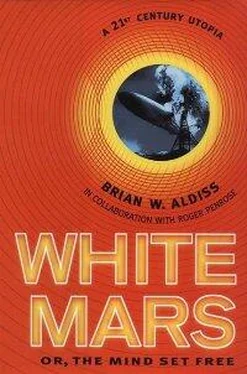Brian Aldiss - White Mars
Здесь есть возможность читать онлайн «Brian Aldiss - White Mars» весь текст электронной книги совершенно бесплатно (целиком полную версию без сокращений). В некоторых случаях можно слушать аудио, скачать через торрент в формате fb2 и присутствует краткое содержание. Год выпуска: 1999, ISBN: 1999, Издательство: Little, Brown UK, Жанр: Фантастика и фэнтези, на английском языке. Описание произведения, (предисловие) а так же отзывы посетителей доступны на портале библиотеки ЛибКат.
- Название:White Mars
- Автор:
- Издательство:Little, Brown UK
- Жанр:
- Год:1999
- ISBN:0-316-85243-0
- Рейтинг книги:5 / 5. Голосов: 1
-
Избранное:Добавить в избранное
- Отзывы:
-
Ваша оценка:
- 100
- 1
- 2
- 3
- 4
- 5
White Mars: краткое содержание, описание и аннотация
Предлагаем к чтению аннотацию, описание, краткое содержание или предисловие (зависит от того, что написал сам автор книги «White Mars»). Если вы не нашли необходимую информацию о книге — напишите в комментариях, мы постараемся отыскать её.
White Mars — читать онлайн бесплатно полную книгу (весь текст) целиком
Ниже представлен текст книги, разбитый по страницам. Система сохранения места последней прочитанной страницы, позволяет с удобством читать онлайн бесплатно книгу «White Mars», без необходимости каждый раз заново искать на чём Вы остановились. Поставьте закладку, и сможете в любой момент перейти на страницу, на которой закончили чтение.
Интервал:
Закладка:
I can never forget my father’s cries of misery and remorse. He howled like a dog over mother’s dead body.
Exhaustion set in among the struggling factions. The war finally petered out. Days came when no shells were fired at us.
A party of the enemy arrived in a truck, waving white flags, to announce an armistice. The leader of the party was a smartly uniformed captain, wearing incongruous white gloves. Quite a young man, but already bemedalled.
It was the chance our men had waited for. They rushed the truck. They set upon the soldiers with rifles and knives and bayonets, and carved up the party, all but the captain, into bloody pieces. They rubbed the face of one man into the broken glass from the vehicle’s windscreen. They set fire to the truck. I stood in the broken street, watching the massacre, enjoying it, thrilling to the screams of those about to die. It was like a movie, like one of my Biker stories.
The captain was dragged into a burned-out factory down the road. He was stripped of his gloves and his uniform, made naked. Some of Splon’s women were allowed—or encouraged—to hack off his testicles and penis and ram them into his mouth. They beat him to death with iron bars.
I was curious to see what was going on in the burned-out factory. A man stopped me from entering. Other boys got in. They told me about the atrocity afterwards.
Next day, a Red Cross truck rolled into town. My father and I were evacuated. My father had lost his will to live, dying in his sleep some weeks later. That was in a hospital in the German city of Mannheim.
While I was laid low in hospital these past memories returned vividly to mind. I was forced to relive them as I had rarely done before. In fear of the horrors of that awful period, I recognised my strong desire for a better ordered society, and for a time and place where reason reigned secure.
Mary and I sat up in bed. She listened sympathetically as I told my tale. Tears, pure and clear, escaped from her eyes and ran down her cheeks.
Perhaps the riddle of Olympus had brought on my horrors. The mood under that vast carapace could be one of regret, rage even, at the way the life forms had had to imprison themselves in order to survive as the old free life died. A billion years of rage and regret…?
Several visitors came while I was recovering. They included Benazir Bahudur, the silent teacher of children.
She said, “Until you recover fully your ability to move, dear Tom, I will dance for you to remind you of movement.”
She danced a dance very similar to the one I had watched once before. In her long skirt, with her bare arms, she performed her dance of step and gesture, as supple and subtle as deep water. Life is like this and this. There is so much to be enjoyed…
It was beautiful and immensely touching. “You manage to dance without music,” I said.
“Oh, I hear the music very clearly. It comes through my feet, not my ears.”
Another welcome visitor was Kathi Skadmorr. She slouched in wearing her Now overalls and perched on the end of the bed, smiling. “So this is where Utopias end—in a hospital bed!”
“Some begin here. You do a lot of thinking. I was thinking of dystopias. Presumably you think about quantum physics and consciousness all the time…”
She frowned. “Don’t be silly, Tom. I also think a lot about sex, although I never perform it. In fact, I spend much time sitting in the lotus position staring at a blank white wall. That’s something I learned from you lot. It seems to help. And I also recall ‘I saw a new heaven and a new Earth: for the first heaven and the first Earth were passed away.’ Isn’t that what you Christians say?”
“I’m not a Christian, Kathi, and doubt whether the guy who wrote those words was either.”
She leaned forward. “Of course I am fascinated by scientific theory—but only because I would like to get beyond it. The blank white wall is a marvellous thing. It looks at me. It asks me why I exist. It asks me what my conscious mind is doing. Why it’s doing it. It asks if there are whole subjects the scientists of our day cannot touch. Maybe daren’t touch.”
I asked her if she meant the paranormal.
“Oh, the way you use that label. Tom, dearest, my hero, your adopted daughter whom you so neglect—she has inexplicable, paranormal, experiences all the time.
They’re part of her normal life. Nobody can account for them. We need to reconceptualise our thought, as you have reconceptualised society. Stop clinging to frigid reason.
“Chimborazo is a million times stranger than Cang Hai’s world, yet we think we can account for it within science, can accommodate it within our perceptual Umwelt. Yet all the time it’s performing miracles. Turning a sack of superfluid into a conscious entity … That’s a miracle worthy of Jesus Christ. Yet Dreiser doesn’t turn a hair of his moustache …
“Anyhow, I must be going. I just called to bring you this little present.” From a pocket of her overalls she produced a photocube. In it a complex coil slowly revolved, its strands studded with seedlike dots. I held it up to the light and asked her what it was.
“They’ve analysed one of the exteroceptors they hacked off Chimborazo. This is just an enlarged snippet of its version of a DNA structure. You see how greatly it is more complex than human DNA? Four strands needed to hold its inheritance. The doubled double helix.”
When I was up and about I went to see Choihosla again, this time taking the trouble to knock at his door. We talked these matters over. I even ventured to speculate whether mankind was experiencing a million years of regret that it had achieved consciousness, with the burdens that accompanied it.
“We all suffer on occasions from the dark soul of the night,” he said.
“You mean the dark night of the soul, Youssef.”
“No, no. Look outside! I mean the dark soul of the night.”
Was it the old quirky sage, George Bernard Shaw, who had said that Utopia had been achieved only on paper? Perhaps it had been achieved too in Steve Rollins’s simulation. The people in his quantputer went about their business without feeling, without any sense of tomorrow, being subject to Steve’s team’s supervision. Not a sparrow fell without proper computation. An enviable state?
It was time to get to work again.
I called the advisers of Adminex to me. The date was the first day of Month Ten, 2071.
“Hello!” Dayo said, seeing me with my stick for the first time. “What’s happened to you?”
“The human condition,” I told him.
It was necessary to set about drawing up a constitution for our community. We needed to have the best possible way of life memorialised and, as far as might be, made clear to all.
The Adminex meeting was well attended. Clearly the external threat—if threat it was—from Chimborazo had served to excite our intelligence, if not to unite us. Only once before had so many people attended our forums, when Dreiser had addressed us. They gathered under the doomed Hindenburg and sat there quietly. By now, I thought with affection, I knew all of their faces and most of their names, these creatures of a human Olympus.
A late arrival at our discussion was Arnold Poulsen, who came by jo-jo car. It was a long while since I had seen him; he so rarely entered our forums. He sat now, his hands clasped between his knees, his long pale hair straggling about his face, saying nothing, contributing nothing but his presence.
Because I had been away I knew that things had moved on, and I anticipated argument and opposition. But even Feneloni seemed to have undergone a change of mind.
Speaking slowly, he said, “I must put aside my reservations regarding your creation of a better and just society. I felt the wisdom of your judgement while I was shut away, and it seems to have had its bearing on my change of mind. While it’s true I long to get back to Earth, that’s no reason to create difficulties here. I can’t exactly bring myself to back you, but I won’t oppose you.”
Читать дальшеИнтервал:
Закладка:
Похожие книги на «White Mars»
Представляем Вашему вниманию похожие книги на «White Mars» списком для выбора. Мы отобрали схожую по названию и смыслу литературу в надежде предоставить читателям больше вариантов отыскать новые, интересные, ещё непрочитанные произведения.
Обсуждение, отзывы о книге «White Mars» и просто собственные мнения читателей. Оставьте ваши комментарии, напишите, что Вы думаете о произведении, его смысле или главных героях. Укажите что конкретно понравилось, а что нет, и почему Вы так считаете.










